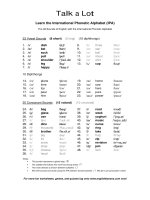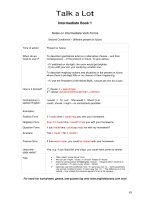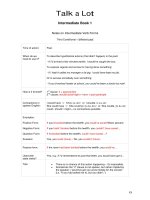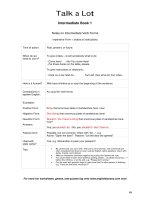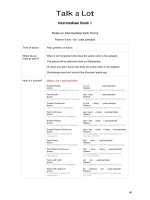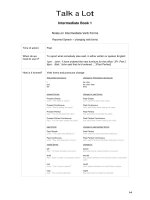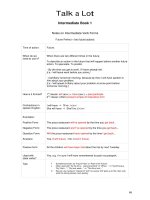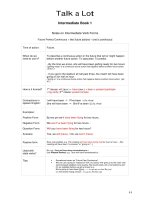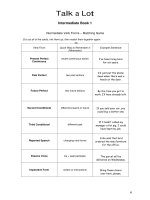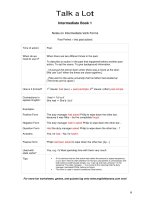talkalot intermediate book 1 more features of non literal english
Bạn đang xem bản rút gọn của tài liệu. Xem và tải ngay bản đầy đủ của tài liệu tại đây (487.59 KB, 4 trang )
Talk a Lot
Intermediate Book 1
More Features of Non-Literal English
1. ABBREVIATION / SHORT FORM
A shorter version of a word or phrase.
Example:
“Are you going to uni today?” [university]
“Yes, later on. But I’ve got to pop to the doc’s first.” [doctor’s]
When:
When you need to speed up communication. It’s not necessary to say the full word, because both of you
know what you mean by the shorter form.
2. BANTER
An informal conversation (chat) where the participants use humorous language and techniques to
entertain each other (e.g. friends chatting with bar staff at a pub), and perhaps an audience (e.g. on a
radio show the hosts indulge in banter) in a spontaneous, unscripted way. Can contain many examples
of idioms, phrasal verbs, and slang.
Example:
“I went out last night.”
“You went out? I thought you were stony-broke!” [without money]
“I was.”
“What, did you meet…? Have you got a bit on the side?”
“A bit on the side? What another Sheila?” [Australian slang for “girlfriend”]
“No, I meant another job, but tell me more about your Sheila!”
“You’re impossible!” [etc.]
When:
When you enjoy spending time with friends or family and chatting in a relaxed way about things that are
not really important. If you worked on a radio show, you could get paid for chatting about your daily life
and topics of national interest in an entertaining way.
3. DOUBLE ENTENDRE
A phrase which can have two meanings or interpretations: one literal (and innocent) and the other
sexual. It literally means “double meaning”, from the French: entendre = to mean/understand.
Example:
[Two men are walking in a park where there are some pear trees. A woman wearing a tight t-shirt is
walking towards them. One man comments:]
“What a lovely pair!”
[His comment could be interpreted as either “a lovely pear” – as in the fruit, which is visible – or “a lovely
pair” – as in the pair of breasts that the woman’s t-shirt displays. The pun works because the words
“pear” and “pair” are homophones, having the same sound when spoken, but different meanings.]
When:
When you want to make a risqué joke, but have the get-out clause that you meant the literal
interpretation, not the sexual one. So if the woman took offence at his remark, he could protest, “I
meant, pear – as in the fruit! What did you think I meant?”
For more fun worksheets, games, and quizzes log onto www.englishbanana.com now!
1
Talk a Lot
Intermediate Book 1
More Features of Non-Literal English
4. EXPRESSIONS
A kind of idiom that may not be as well known or visual as general idioms, or one that you’ve made up
yourself. The phrase has both a literal meaning and a figurative meaning, that often does not make
sense literally.
Example:
“Would you like another cream cake, gran?”
“Ooh, thank you, dear. I don’t mind if I do!” [I will have another cream cake]
When:
When you want to say something more interesting than standard dictionary words and phrases, perhaps
to show yourself to be a little bit different or eccentric.
5. FUNNY VOICES / FUNNY ACCENTS
You say something using a funny voice or a comic version of a foreign accent.
Example:
[You are pretending to be a toy robot, because you don’t want to tidy your bedroom.]
Mum: “Will you tidy your room?”
You (in a metallic, monotone voice): “Your command does not compute! Processing error! Processing
error! Must. Go. Out. Side. Play. Football!” [etc.]
Mum: “You’re not going anywhere until you’ve tidied your room!”
When:
When you want to pretend, play, have fun, make somebody laugh, or generally behave in a silly way. Or
when you want to make somebody else look stupid, e.g. by imitating their voice, or when you want to
show a humorous, stereotypical view of a particular people, e.g. the French, the Germans, the Welsh,
etc., which might be funny to some but offensive to others.
6. INNUENDO
Similar to double entendre, this is a phrase which can have two meanings or interpretations: one literal
and the other implied or hidden. However, the hidden meaning can be something other than sexual.
Example:
[Two clerks are working in an office. Jeff enters with a female colleague. They are both late for work.
Jeff is holding a pile of folders. One clerk says:]
“I see that Jeff’s still taking his work home with him!”
[His comment could be interpreted literally, due to the folders, as in “Jeff is taking work to do at home”,
but is meant as an allusion to the context: both members of staff coming in together – late. So “taking
his work home with him” = “having an affair with his colleague”.]
When:
When you want to say something that is gossipy or offensive, but retain the option to claim that you
meant the literal interpretation, if the listener challenges your remark – i.e. if they are not in agreement
with the intended coded meaning.
For more fun worksheets, games, and quizzes log onto www.englishbanana.com now!
2
Talk a Lot
Intermediate Book 1
More Features of Non-Literal English
7. JOKE / GAG
You tell a joke with the direct aim of making somebody laugh.
Example:
“A horse is sitting at a bar reading a newspaper. The barman comes up to him and says, ‘Alright, mate?
Why the long face?”
[The concept of a horse sitting at a bar reading a newspaper could be funny on its own, but the joke
comes from the double meaning (pun) barman’s use of the idiomatic phrase “Why the long face?” which
means “Why do you look sad?” A ‘long face’ is a sad face. But of course horses naturally have long
‘faces’, so the horse can’t help appearing sombre.]
When:
When you want to make somebody laugh, e.g. a comedian in a comedy club or on TV, a radio DJ, two
friends telling each other jokes on the bus, etc.
8. PARABLE
A short, easy-to-understand story that has a deep meaning which is relevant to the situation that is
being discussed. It is implied or obvious that the hearer – if they are able to decode the veiled meaning
– should learn how to deal with their situation by listening to the parable and following the advice.
Example:
“I can’t decide whether to leave my job, where I’m comfortable, and take a new job, that looks difficult,
but more challenging…”
“Well, there was once a woman who had two daughters. One worked in the fields beside her home
every day, had very few cares, and reaped a small harvest. The other went abroad to seek her fortune,
went through many trials and tests, but returned home very rich. The moral is: fortune favours the
brave.” [the implied meaning is: you should take a chance and accept the new job, because it could be
beneficial to challenge yourself]
When:
When you want to give advice or illustrate a moral or lesson in an indirect way, without appearing too
prescriptive.
For more fun worksheets, games, and quizzes log onto www.englishbanana.com now!
3
Talk a Lot
Intermediate Book 1
More Features of Non-Literal English
9. RUNNING JOKE
Something which is not fundamentally amusing becomes funny by being repeated often.
Example:
[In the popular British sitcom from the 1980s, ’Allo ’Allo, there were many running jokes – jokes that
were repeated in every episode – sometimes several times per episode! One example is when the
English character, who was pretending to be a French policeman, appeared he would say:]
“Good moaning.”
[He mispronounced “morning” because he thought he was using a good French accent. This phrase is
not funny on its own, but each time he did this – very often – there would be gales of laughter from the
studio audience. It became funnier with repetition. See also catchphrase, Unit 2: Problems, P.39.]
When:
When you want to make people laugh but can’t (or don’t want to) think up any traditional jokes.
Repetition makes people feel that they are “in” on something that other people “don’t get” (see also injokes, Unit 4: Getting a Job, P.37).
10. SATIRE
You tell a joke with the direct aim of making fun of the government or somebody in authority.
Example:
[Imagine this context: the foreign secretary has been caught taking bribes worth a total of £1,680:]
“Why is the foreign secretary like a used Robin Reliant [old-fashioned and much-mocked car]? They can
both be bought for well under £2,000!”
[The juxtaposition of the foreign secretary and the second-hand, unfashionable Robin Reliant (a car with
a poor reputation) is humorous on its own, but the joke comes from the double meaning, or pun, of “to
be bought”, which has both the literal meaning of “purchased” and also the idiomatic meaning of
“bribed”.]
When:
When you want to draw attention to the failings of politicians or people in authority without directly
stating your meaning, instead allowing your audience to perceive the implied message in what you are
saying. Direct statements are the stuff of speeches or diatribes, rather than comedy. By making the
audience do some of the work in identifying the meaning, the person speaking involves them and draws
them into their worldview.
For more fun worksheets, games, and quizzes log onto www.englishbanana.com now!
4
